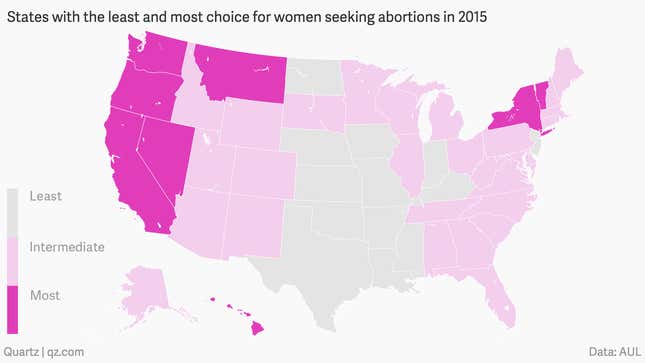A bill introduced in Republican-controlled Wisconsin to ban abortions 20 weeks after conception is likely to become law in the next few weeks. That would make it the 38th new law across 11 US states set this year to restrict women’s access to abortion.
The abortion debate has a long and divisive history in the US. The Supreme Court’s 1973 Roe v Wade judgement set the legal precedent that a woman’s decision to have an abortion was part of the constitutionally-enshrined right to privacy. That divided the country into pro-choice and pro-life camps, with Democrat-controlled states on one side and Republican-controlled ones on the other.
Though subsequent challenges have failed to overturn Roe v Wade, anti-abortion groups have chipped away at making the access harder in certain states. This has included methods such as cutting the use of federal funds for abortions, banning the use of government facilities to perform them, and prohibiting healthcare workers from mentioning abortion as an option. The states leading the latest charge against abortion are Louisiana, Mississippi, Kansas, Oklahoma and Arkansas.

In Roe v Wade, the court ruled that a woman has a right to abortion until “viability”, the point when a fetus can potentially live outside the womb with artificial aids. The judgement placed the minimum viability at 24 weeks. However, the sponsor of the current Wisconsin bill, Republican representative Jesse Kremer, said: “Viability is not the only compelling reason to preserve life. It has been determined that by the fifth month of pregnancy, or 20 weeks, an unborn child is able to feel pain.”
Science does not support this claim. According to a 2010 report by Britain’s Royal College of Obstetricians and Gynaecologists, fetuses do not have the neural connections needed to feel pain.
When the Wisconsin bill becomes law, any physician breaking it may face a 42-week prison sentence or $10,000 fine. More than 200 such laws have been passed in the last four years, when abortion opponents started acting as part of a coordinated strategy (paywall), according to the New York Times.
Although 89% of abortions are conducted within 12 weeks of pregnancy, many restrictions together can have a large impact. For instance, in Texas, which has passed many such laws, including one banning abortion after 20 weeks, the number of abortion clinics has halved in just over a year.
